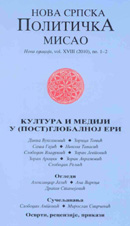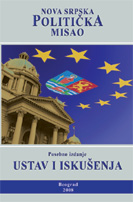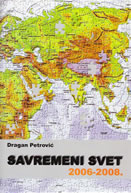| NSPM in English | |||
The New Year |
 |
 |
 |
| четвртак, 31. децембар 2009. | |
|
(The National Interest, 30.12. 2009)
In contrast to the hubbub about health care that has preoccupied Washington, it won’t be a big deal in the coming year. Obama will sign a bill in January and trumpet it as a big success, while the GOP carps about its cost. But like most social programs, it will quickly come to be accepted as a constitutional right by most Americans, who may complain about big government but love its largesse, as long as they aren’t asked to pay for any of it themselves. It’s the wealthy who get stuck with the tab (and a wacky estate tax that the Democratic leadership in the Senate claims it will now impose retroactively this year, as unconstitutional a measure as there ever was), while pundits fret about the plight of the middle-class, which hardly pays any income tax. So if Republicans continue to complain about health care, it won’t get them far in the 2010 midterm election. Unemployment will remain high—around nine to ten percent—but Obama will be able to point to a slowly recovering economy as evidence that he got it right in pushing for stimulus spending. Nor will rhetoric about taxes help the GOP. Instead, it will be foreign policy that proves the crucial battleground. Obama has taken a number of steps to shore up his bona fides on the Right. His most conspicuous move has been to act like George W. Bush’s mini-me and embrace a surge in Afghanistan, which has won him hosannas among the neocons. Obama has tried to hedge the surge by announcing a deadline, but who honestly believes that America will be drawing down troops in Afghanistan any time soon? Not even the most ardent Obama admirer can possibly believe that. The more likely scenario is that Afghanistan proves something of a draw over the next year. Obama sends more troops, the Taliban retrench and Pakistan muddles through. What about Iraq? Obama will continue to withdraw our forces, but sectarian violence will flare up. It will be an inglorious retreat from Iraq. But Iran won’t be able to exploit it. The truth is that the Bush strategy of banking on a bunch of internal revolutions in the Middle East may not come to pass. But Iran, the biggest bugaboo of the Right and Israel, is in deep trouble. The regime is tottering. The religious regime, that is. It’s possible that the clerics will lose even more power and the Basij militia will emerge triumphant, creating a truly totalitarian regime. Or revolution looms. The second scenario seems more likely. But who will emerge from this Iranian revolution to lead the country? Somehow Iran seems to get itself into a dreadful muddle when it comes to its governments. This glorious Persian nation should, by rights, be the most liberal and prosperous country in the Middle East. Instead, it seems to end up with repressive authoritarian leaders. But Iran will prove a big test for Obama when it explodes. How he handles it could make or break his presidency, just as it did Jimmy Carter’s. The best he will be able to do initially is nothing. But if a new regime is in Tehran over the next year, he’ll have to move quickly to restore relations with it. If the revolution is forcibly crushed, however, Obama will be vulnerable to the accusation from the Right that he’s sold out the freedom-fighters in Tehran. Meanwhile, oil prices will be sky-rocketing and nothing will have been done to stop Tehran’s push for a nuclear weapon. Not exactly the right stuff for an election campaign back in the USA. Then there is the danger of a terrorist attack in America. Should al-Qaeda successfully pull off a plot—say, on July 4—then the criticism of Obama over the Detroit incident will look like a tea party. The GOP’s slogan will be as simple as it is effective: are you safer than you were two years ago? If the answer is clearly no, then the Democrats will suffer a devastating defeat in 2010. If it is a resounding “yes,” however, then Republican gains in 2010 will be much slimmer than the GOP currently hopes. The coming year will be decisive for Obama’s fortunes, showing whether Obama is, in fact, the true disciple of Bush in exploiting national-security issues for a political edge or whether he cedes them, willy-nilly, to his adversaries. If Obama doesn’t want to leave the Democrats up in the air over the next year, he’ll have to remind everyone why he’s a serious man. There’s an easy way for him to solve the problem. If Iran remains an authoritarian regime, he can authorize a devastating bombing campaign against Tehran. It would be Obama’s version of an October surprise. Bush couldn’t do it. Obama may. Jacob Heilbrunn is a senior editor at The National Interest. |
Остали чланци у рубрици
- Playing With Fire in Ukraine
- Kosovo as a res extra commercium and the alchemy of colonization
- The Balkans XX years after NATO aggression: the case of the Republic of Srpska – past, present and future
- Из архиве - Remarks Before the Foreign Affairs Committee of the European Parliament
- Dysfunction in the Balkans - Can the Post-Yugoslav Settlement Survive?
- Serbia’s latest would-be savior is a modernizer, a strongman - or both
- Why the Ukraine Crisis Is the West’s Fault
- The Ghosts of World War I Circle over Ukraine
- Nato's action plan in Ukraine is right out of Dr Strangelove
- Why Yanukovych Said No to Europe

.jpg)








 The New Year—no, make that the new decade—is starting to look as though it might resemble the old one. The attempted bombing of a Northwest Airlines flight headed into Detroit airport on Christmas rang out the year rather conclusively on a somber note, not one that President Obama, ensconced in his Hawaiian retreat, devoting himself to improving his golf game and catching a few rays, seemed to want even to acknowledge. He emerged from his idyll to announce, a few days after Friday, that it was necessary to be vigilant. But it wasn’t vigilance, but a cogent analysis of the perils represented by an al-Qaeda agent that was missing in the national-security bureaucracy. If the Obama administration’s response to the abortive terror act is any guide to go by, it might well be a rather rocky year for America, at least in foreign policy. Herewith my predictions for what might go wrong—as well as right—in 2010.
The New Year—no, make that the new decade—is starting to look as though it might resemble the old one. The attempted bombing of a Northwest Airlines flight headed into Detroit airport on Christmas rang out the year rather conclusively on a somber note, not one that President Obama, ensconced in his Hawaiian retreat, devoting himself to improving his golf game and catching a few rays, seemed to want even to acknowledge. He emerged from his idyll to announce, a few days after Friday, that it was necessary to be vigilant. But it wasn’t vigilance, but a cogent analysis of the perils represented by an al-Qaeda agent that was missing in the national-security bureaucracy. If the Obama administration’s response to the abortive terror act is any guide to go by, it might well be a rather rocky year for America, at least in foreign policy. Herewith my predictions for what might go wrong—as well as right—in 2010.












